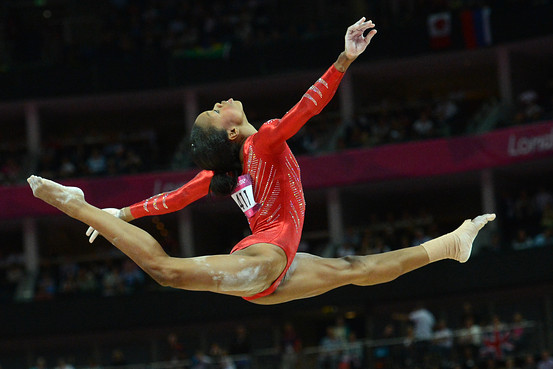
Wait a second, I get a lot of views from Russia. I'd better add in another picture.

And to all of you racist morons out there who are upset because Gabby's black, replicate that position. Right now. But make sure to jump first. I will laugh as you scream in pain.
Now, I don't think I need to tell you what happened in London a few days ago. What you see in that second picture is a fine example of teamwork. Together, we both beat China. And to think we spent all those decades not getting along.
My parents want me to delete that last part because they're afraid somebody's going to aim a rocket at our house. But all the 2012 gymnasts were born after than era and I don't get many Chinese pageviews, so I'm not particularly concerned.
But really, don't. If you are Russian and I have upset you, leave a comment about Aliya Mustafina's other gold medal. For bars. Which is not all around. So it's not that special. But still special.
And that brings me to the part where I stop gloating and make this relevant. Believe it or not, I had this post planned out before I watched a single gymnastics event. Back when I thought China was going to win everything.
Everybody dreams of going to the Olympics when they're little. Sure, most of us end up sitting on the couch years later, watching from a couple thousand miles away, wishing we had muscles like that. But some people spend years working for a chance to compete. And for some of them, not as many years as you might think.
When you get old, your body doesn't want to do this anymore:

So naturally enough, most athletes are young. Hiroshi Hotshetsu might argue on that. At the age of 71, he's the oldest Olympian to compete in 2012.

But the horse is doing a lot of the work here.
In 1981, the FIG decided to raise the minimum age from 15 to 16. You can still compete if you're turning 16 in the current calendar year. Kyla Ross of the US team is was born in October of 1996.
The stated reason is that gymnastics is extremely rough on the body and they don't want younger gymnasts to be injured. Lots of people object to that, though, and say they're really trying to level the playing field. Bela Karolyi (coached Nadia Comeneci for Romania and now coaches the US) is famously against the regulation.
Younger gymnasts have several mental and physical advantages. They tend to be bolder and less fearful. Their bodies are lighter and more flexible. When they hit puberty, growth spurts and weight changes can through off their centers of gravity. And then there's four year gap. You can only compete for so long.
They're have been numerous cases of age falsification, most notably from North Korea, Romania, the Soviet Union back when it was the Soviet Union, and China. Yes, China. I'm sure that's going to come as a surprise to everyone. They have a twenty year old on their 2012 team who's only 4' 6'', or somewhere around 137 centimeters. Often it's the countries who decide to fake the gymnasts' age without their consent.
Way back in 1896, Dimitrios Loundras won a bronze medal with the Greek men's gymnastics team. He was ten.
Any sport is rough when you go at it with Olympic intensity and it's not a bad idea to protect children from danger. But if they can work themselves, defy their age and experience, is it right to prevent them from achieving greatness?
 |
| Yeah, yeah, I'm gloating again. |
I really like your content it is really very inspiring for I guess I have selected a mind blowing and interesting blog.sDoanminhThang
ReplyDelete